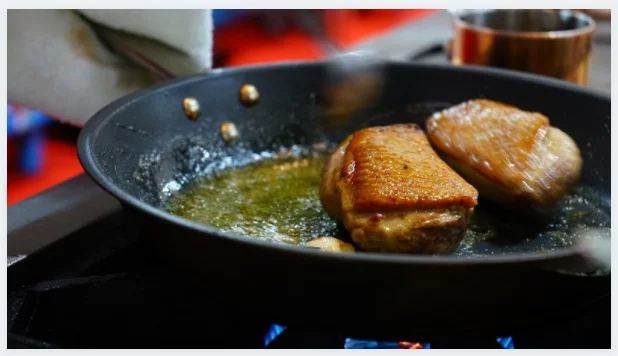The ingredients you use affect the final taste of your recipes, but your cookware also plays a factor in each dish’s success. Creating a masterpiece often involves understanding the best pans for cooking a given meal. Below, we’ll discuss common cookware types’ pros and cons, as well as the impact each can have on your food.
Table of Contents
Cookware With Nonstick Coatings
Iron Cookware
Aluminum Cookware
Terracotta Cookware
Stainless Steel Cookware
Selecting the Best Pans to Cook With
Cookware With Nonstick Coatings
We’ll start with a wildly popular type of cookware — nonstick. With nonstick coatings, you can use less fat as you cook, and they generally won’t alter the flavors of your dish. They may conduct heat differently than other cookware, so opt for lower temperatures when you’re first experimenting with a nonstick pan.
Iron Cookware
Many people swear by their cast iron frying pans. Cast iron is easy to use and clean up, and it conducts heat well. Additionally, it can add a tinge of iron to your food. You may taste it through intensified flavors, especially if your cast iron cookware has been around for a while and is seasoned from years of cooking.
Aluminum Cookware
Pots and pans made from aluminum are shiny and attractive. They distribute heat evenly, making them excellent options for boiling water or quickly heating stews and sauces. They tend to intensify the strong undertones and aromas of cruciferous veggies, so reconsider your cookware if you like your broccoli a little less bold.
Terracotta Cookware
When baking, terracotta (ceramic) cookware can help you achieve juicy, delicious dishes every time. Typically, ceramic pots add minimal flavoring to foods. Just be cautious if you have an older pot or a glazed model, which can contain chemicals like lead that aren’t food-safe.
Stainless Steel Cookware
You’ll find a lot of stainless steel in professional kitchens. The only issue with these tried-and-true pots and pans is that they can start to discolor with continued heat exposure. In time, starchy foods like pasta can change your shiny new pot’s appearance.
If you have a nickel allergy, stainless steel might not be the best option. Cookware made with this material may release trace amounts of nickel, leaving food with a metallic flavor — and you with an allergic reaction.
Selecting the Best Pans to Cook With
Ultimately, you need to experiment and discover which types of pots and pans are best suited for your habits. Over time, you’ll feel more confident knowing when to reach for your stainless steel saucepan and when to grab your cast iron skillet.
Looking for the highest-quality soy sauce to diversify your meals, no matter what cookware you use? Trust our store locator to find SAN-J products or buy online at your convenience.
Back to Top
